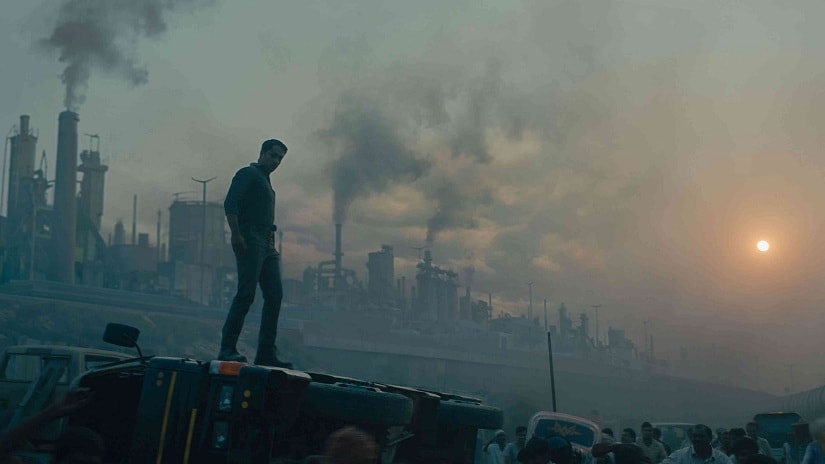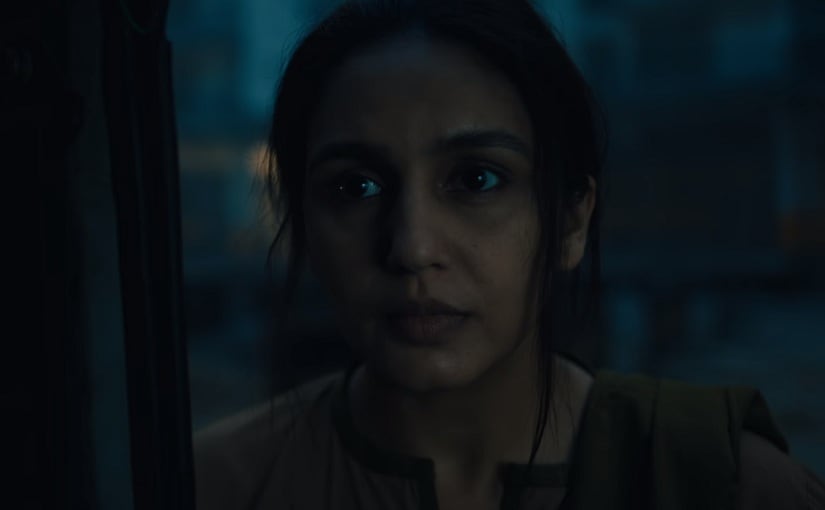In the pilot episode of Netflix’s dystopian drama series, two women are fighting while in line to bathe in the community bathroom at the Shram Kendra (a “purity camp” for women who dare to rebel against the Council — a group of powerful, elite politicians who make the rules of this dystopian setting). One women is spewing a train of abuses (think of the filthiest ones possible) but the gasps and jaw-drops happen when the other women says, “bloody doosh.” As a viewer, I have no idea what this word means. Is it douche? If it is, why is everybody so offended? Later in the second episode, I find out “doosh” is actually an insult reserved for the oppressed classes/castes. This scene not only held a mirror to my cocooned interpretation of Leila, as a fairly privileged upper-caste woman, but it also reinforced the idea that oppression can germinate anywhere (and everywhere.) [caption id=“attachment_6808701” align=“alignnone” width=“825”]  Arif Zakaria plays Dr Iyer, incharge of the Purity Camp, in Leila. Screengrab from Youtube.[/caption] In the intricately fictionalised world of Leila, the lines between make-believe and horrifying reality are often blurred. It is what makes the viewing experience so visceral. Based on the eponymous novel by Prayaag Akbar, Leila is a dystopian drama series helmed by three directors: Deepa Mehta, Shanker Raman, Pawan Kumar. At its core, Leila is a story of a mother’s search for her missing daughter. The series begins in 2047 (in the “near future” — interesting choice of words, sigh). Shalini (Qureshi) has married her college sweetheart Riz (Rahul Khanna) and they have a daughter together, Leila. The family lives secretly, and in danger, as inter-religious marriages are frowned upon by the Council. The city (could be any modern Indian one) has been ghetto-ised into segregated communities — the Tamil Brahmin Sector, Leuva Patel Residency, Bohra Muslim Zone, Catholic Commons, Syrian Christian Co-op, and so on — and the misfits (aka oppressed classes and castes) have been cordoned off beyond the Purity Wall, to the Slums and the Towers, where filth and garbage pile up into sky high mountains, with pockets of fire adding to the smog that overpowers the skyline. The war for water is at the centre of conflict in this universe, as even the rain is black in colour. The elite members inside the Purity Wall are shielded from the toxicity, with hollow, covered roads that ferry them in and out. [caption id=“attachment_6808761” align=“alignnone” width=“825”]  Bhanu (Siddharth) in the foreground, and the toxic skyline as seen from the Slums, beyond the Purity Wall. Youtube screengrab[/caption] Nothing is pure, and yet everyone is striving for purity. The segregation is encouraged by rampant patriarchy and wide-spread, extreme inequality. As I type this, I’m making a mental note of how much of this can be attributed to current day India. Cue goosebumps. Riz and Shalini live in East End, the last sector to have mixed couples and those who dare to rebel against the State. Minutes into the pilot episode, a bunch of saffron-gamcha wearing goons, called the Repeaters (state-appointed thugs who enforce “purity”), forcibly enter their apartment, kill Riz and kidnap Leila. They take Shalini to the Sharm Kendra, where she is treated like an ostracised widow. The first half of the episode is spent in exploring the setting. It plays out like The Handmaid’s Tale meets the prison scenes from Sriram Raghavan’s Ek Hasina Thi. Shalini and the other women are given drugs to suppress their emotions, and any form of rebellion is met with extreme punishment (in one scene, a woman is married off to a dog for refusing to comply with officials.) [caption id=“attachment_6808731” align=“alignnone” width=“825”]  Huma Qureshi and Siddharth in a scene from the series. Youtube screengrab.[/caption] Cut to two years later, Shalini is sent to work for the elite as domestic help inside the Purity Wall. Bhanu (Siddharth) is given the responsibility to transport her from the Kendra inside the Wall, but Shalini escapes to try and find her daughter. In the unwinding and cluttered streets of the slum, Shalini meets Roop, a young vagabond girl who helps her cross to the highway. The scenes between Shalini and Roop are heart-warming (a rare emotion to come by in the series), and brings in necessary respite. Bhanu is an interesting character on both ends of the morality spectrum; he works for the State and furthers inequality but each scene uncovers his character, and we know there’s some goodness hiding in there. It also helps that Siddharth is a fantastic actor capable of complex scenes. He makes emoting seem so effortless, and this is in a show that spends most of its screen time on close-ups of Huma Qureshi’s face. Also on Firstpost: How Leila, Netflix's upcoming dystopian drama series, was conceptualised and executed The supporting characters in the show add much value — be it Arif Zakaria, Seema Biswas or Rahul Khanna. But it is Huma Qureshi who really holds her own. In the three episodes I had access to (it’s a six-part series), she had to do most of the heavy lifting. With such a dense concept to work with, it is impressive that my attention was on her and not breaking down the world that the show inhabits. More Bollywood actors need to put their egos aside and embrace the web space, because it has so much potential for characterisation and sustained performance. Huma shows them the way, in Leila. In the book, the character of Shalini is defined by being a wife and a mother. Even her flashbacks identify her basis just those two roles. But in the series, Huma gives her character a sense of individuality and gutso . She is not a victim, and won’t resign to her fate. She will fight. [caption id=“attachment_6808751” align=“alignnone” width=“825”]  Closeups on Huma Qureshi’s face help with characterisation. Youtube screengrab.[/caption] By the third episode, we get some insight into the politics at work in the State. We learn of undercover rebels, working to usurp the current totalitarian regime. We are told more details of how it reached to a point of ‘Jai Aryavarta’ — a ‘Hail-Hitler’ type slogan to “commemorate” Aryavarta, now a Hindutva nation (and identity). It is in this name that all of the inequality and “purity exercises” are meted out. It will be interesting to see how they further the plot in the next three episodes. So much to portray, so little time. Leila, the series, is crisper than the book, putting elaborate adjectives aside in favour of pace. The visuals are stark in the series, under the direction of the ever-talented Shanker Raman. The production design is detailed and meticulous, and tell a story of their own (we see some graffiti in the background of the Slums, as Shalini searches for her daughter; one that really stuck with me, read, “whose progress, whose country”.) [caption id=“attachment_6808721” align=“alignnone” width=“825”]  Shalini and Roop walk by a graffiti-filled wall in the Slums. Youtube screengrab.[/caption] You’ll have to revisit the episode to look for flaws — and that can be good and bad. Good because the narrative of Leila distracts you from looking at it from a critical point of view; you get so absorbed into the story, it is hard to establish what you don’t like. Bad, because once you go back and watch the episodes again, the flaws pop right up. For one, there seems to be a lot of weightage given to shock value (gore, filth and expletives abound) and sometimes the horrors are too pronounced. This works in some scenes when establishing themes are necessary, but I can’t help but wonder if the series could do with some subtlety (this can also be said about the dramatic background score every time maternal love is explored.) More comparisons with the India of today would make the horrors more palpable as opposed to shock-value scenes. That said, the timing of Leila could not be more apt. When the trailer of the series released, many on Twitter started a boycott movement as they felt the show portrayed “Hinduphobia.” You know what they say: those who are guilty believe every piece of fiction is about them. Prayaag Akhbar’s book holds a mirror to current day Indian society, offering a critique of Liberal complacency, political disdain and normalisation of oppressive structures. Netflix’s Leila takes it one step further — this is a highly engaging show with memorable moments and impressive performances. Too many people are calling Leila a futuristic show set in an imaginary world. But is it, really? Leila streams on Netflix from 14 June. Language: Hindi, English Rating: ★★★★ Watch the trailer here:
Netflix’s Leila is a highly engaging show with memorable moments and impressive performances.
Advertisement
End of Article


)
)
)
)
)
)
)
)
)



